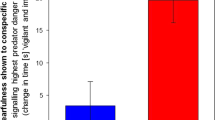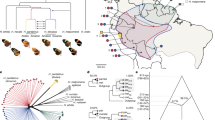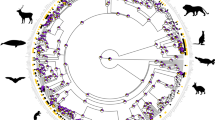Abstract
THE young of birds and mammals often solicit food from their parents in ways that appear to be costly and to reduce their fitness1, 2. Thus birds in the nest beg vigorously for food, incurring energetic costs and possibly attracting predators3; the behaviour of young mammals requiring to suckle (bleating or crying, for example) similarly appears costly1, 2. If solicitation is a means by which the young communicate need to their parents, why has a less expensive form of communication not evolved4? An answer to this question is provided by the theory of parent–offspring conflict: natural selection acting on genes expressed in the young will lead to greater demands for parental resources than is optimal for the parent1, 5. The accurate communication of offspring need is evolutionarily unstable as offspring will be selected to demand extra resources. Models of parent–offspring conflict have shown that an evolutionarily stable equilibrium can exist at which an offspring solicits resources in a way that reduces its fitness, and a parent provides extra resources to prevent further expensive solicitation6–11. I present an alternative explanation for costly solicitation by showing that the level of offspring solicitation can be a true reflection of offspring need as long as solicitation is costly and the benefits of extra resources increase with need. My analysis suggests that the parent normally allocates resources using accurate information about the condition of the young. The requirement that the signalling system is costly is a direct consequence of the potential for parent–offspring conflict.
This is a preview of subscription content, access via your institution
Access options
Subscribe to this journal
Receive 51 print issues and online access
$199.00 per year
only $3.90 per issue
Buy this article
- Purchase on Springer Link
- Instant access to full article PDF
Prices may be subject to local taxes which are calculated during checkout
Similar content being viewed by others
References
Trivers, R. L. Am. Zool. 14, 249–264 (1974).
Clutton-Brock, T. H. The Evolution of Parental Care (Princeton University Press, Princeton, 1991).
Perrins, C. M. J. Anim. Ecol. 34, 601–647 (1965).
Trivers, R. L. & Hare, H. Science 191, 249–263 (1976).
Hamilton, W. D. J. theor. Biol. 7, 1–16, 17–52 (1964).
Parker, G. A. & Macnair, M. R. Anim. Behav. 27, 1210–1235 (1979).
Stamps, J. A., Metcalf, R. A. & Krishman, V. V. Behavl Ecol. Sociobiol. 3, 367–392 (1978).
Feldman, M. W. & Eshel, I. Am. Nat. 119, 285–292 (1982).
Parker, G. A. Anim. Behav. 33, 519–533 (1985).
Hussell, D. J. T. Am. Nat. 131, 175–202 (1988).
Esnel, I. & Feldman, M. W. Am. Nat. 137, 167–185 (1991).
Harper, A. B. Am. Nat. 128, 99–114 (1986).
Grafen, A. J. theor. Biol. 144, 473–516 (1990).
Grafen, A. J. theor. Biol. 144, 517–546 (1990).
Zahavi, A. J. theor. Biol. 53, 205–214 (1975).
Enquist, M. Anim. Behav. 33, 1152–1161 (1985).
Parker, G. A. in Mate Choice (ed. Bateson, P.) 141–166 (Cambridge University Press, Cambridge, 1983).
Maynard Smith, J. Evolution and the Theory of Games (Cambridge University Press, Cambridge, 1982).
Queller, D. C. Oxford Sun. evol. Biol. 6, 73–109 (1989).
Godfray, H. C. J. & Parker, G. A. Anim. Behav. (in the press).
Godfray, H. C. J. & Parker, G. A. Phil. Trans. R. Soc. B 332, 67–79 (1991).
Dawkins, M. S. & Guilford, T. Anim. Behav. 41, 865–874 (1991).
Johnstone, R. & Grafen, A. J. theor. Biol. (in the press).
Maynard Smith, J. Anim. Behav. (in the press).
Alexander, R. D. A. Rev. Ecol. Syst. 5, 325–383 (1974).
Author information
Authors and Affiliations
Rights and permissions
About this article
Cite this article
Godfray, H. Signalling of need by offspring to their parents. Nature 352, 328–330 (1991). https://doi.org/10.1038/352328a0
Received:
Accepted:
Issue Date:
DOI: https://doi.org/10.1038/352328a0
Comments
By submitting a comment you agree to abide by our Terms and Community Guidelines. If you find something abusive or that does not comply with our terms or guidelines please flag it as inappropriate.



